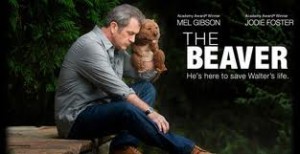The Beaver
There’s a lot going on in “The Beaver”. The film tackles severe depression, daddy issues and marital problems while dragging a huge dose of real-life drama along as well (what with Mel Gibson pissing everybody off with his hateful tirades caught on tape). Beneath the layers of turmoil you’ll find that “The Beaver” is an opportunity for Mr. Gibson to remind us that he can, indeed, act and the performance works as a sort of bizarre PR. Here is a movie about broken man struggling with his past and searching for redemption. Sounds, presumably, like Gibson himself, no? Weather you hate the man or not, he does a great “crazy guy talking to a puppet on his hand”. Whatever that’s worth.

Gibson is Walter Black, a sad man who is near his end when we first meet him. He is lost, dejected and his wife, Meredith (Jodie Foster) wants nothing more to do with him. Walter seems unable to care as he is booted from his home, leaving Meredith with their two equally distressed sons. On his way to a hotel Walter fills the cluttered trunk of his car with a box of alcohol and, while throwing out some trunk trash into a dumpster, finds a tattered beaver puppet which he immediately places on his left hand.
Soon after Walter arrives at the hotel, the Beaver starts to talk to him with a charming Cockney lilt. Or rather Walter begins talking to himself through the Beaver with a charming Cockney lilt. Walter is shocked and mortified and asks why the Beaver has come to him. “Everyone needs a friend,” the Beaver responds and that seems to be exactly what Walter needs to hear. He is instantly changed and goes about making great strides in his fractured existence, reconnecting with his wife and his youngest son. His eldest boy, Porter (Anton Yelchin), is not impressed by the strange behavior and keeps his distance. Porter has many issues of his own and is struggling with familiarities he shares with his dad. Walter becomes vibrant and full of life but when he tries to leave the puppet behind, which has acted as a twisted form of self-help, he finds that the rodent has taken on a life all its own.
The job of bringing Walter and, more to the point, the Beaver to life must have been a daunting task and Gibson pulls it off. The scenes between the “two” characters are delivered without a hitch and it is easy to believe that Walter is in the room with someone else. Foster, who directed, stages their moments together brilliantly and the amount of work spent is obvious. Gibson is frequently shown talking through the puppet, which is shown in the forefront, out of focus. Gibson is the main attraction and the gimmick isn’t overused or made to feel like a joke.
Some much attention was placed on Gibson, however, that the rest of the film feels wanting in parts. Foster’s performance is weak and could have been done by nearly anybody. The parallels between Walter and his son Porter are interesting and much of the reason why we’re watching in the first place but much the subplot is dealt with a clunky, heavy hand. There are spots dealing with Porter and his love interest (Jennifer Lawrence) that could be pulled directly from a Lifetime movie. The end result is an off-balance but intriguing film that could have been better had everyone in the cast been given a puppet to work with as well.





